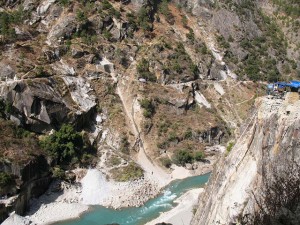
Construction work at Songta dam in Tibet close to Yunnan province border and the Three Parallel Rivers world heritage site
Photo: wodumedia
The Chinese government has announced the continuation of its national plan to dam its many rivers.
The building of the Songta dam in Tibet will begin immediately, a move which threatens to irreparably alter the local environment and population. It faces strong opposition from critics due to both its immediate environmental and social impact, as well as the risks of building a huge structure such as this in an area prone to violent earthquakes. When installed the dam will have a production capacity of 4200 Megawatts.
According to Chinese government sources, the wider dam project will bring “much needed economic growth” to the areas surrounding the Salween River. However, the Songta dam alone is expected to displace over 3,600 locals, and calls from environmental activists within China initially stalled the project for further consultation, following various awareness projects.
As the world’s driest continent, Asia faces intense and ever-increasing competition over its water supply, meaning any move such as this can have wide-reaching and massive ramifications. Many Asian countries have reacted to this through forming treaties. India, Pakistan and Bangladesh all benefit from water-sharing agreements, guaranteeing water even during the dry seasons. Despite, and perhaps as a result of, the enormous water supplies within China, the Chinese government refuses to enter into such agreements.
China, which has more than half the world’s large dams within its borders, bases economic growth over the control and manipulation of its most basic resource – water, and without regulation or control this ‘economic progress’ will continue regardless. The consequences for the nations downstream from China could be comparable to the losses poised to be incurred by the indigenous people along the Salween River.




 Print
Print Email
Email